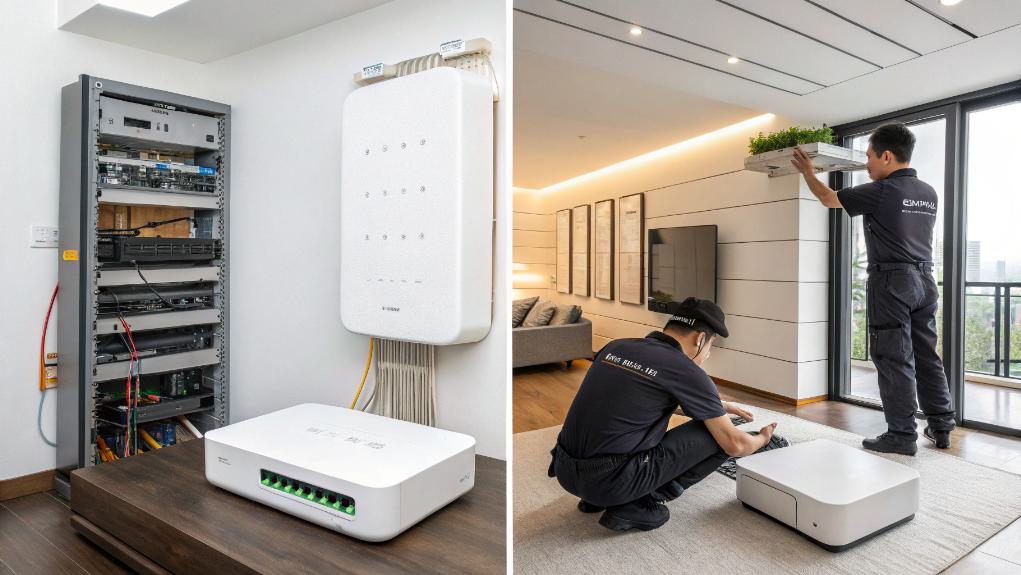I recommend choosing AT&T residential fiber for most home users and small remote workers, while business fiber makes sense for larger operations that need guaranteed uptime.
Residential plans offer great value starting at $55 for 300 Mbps, with potential wireless bundle discounts and reward cards. However, if you need enterprise-level security, 24/7 dedicated support, or guaranteed service levels, business fiber is worth the premium pricing.
While both deliver impressive speeds up to 1000 Mbps, business plans offer up to 10,000 Mbps and include perks like static IPs and no data caps. Let’s explore what specific features matter most for your situation.
Key Takeaways
- Choose Business Fiber if you need guaranteed uptime, enterprise-level security, and 24/7 dedicated support for critical operations.
- Select Residential Fiber for cost savings, as it offers similar speeds at lower prices with optional wireless plan discounts.
- Business Fiber provides symmetrical speeds up to 10,000 Mbps, while Residential maxes at lower speeds but suffices for home use.
- Opt for Business Fiber when data caps and network priority are concerns, as it offers unlimited data and prioritized traffic.
- Choose Residential Fiber if you don’t require specialized installation, dedicated circuits, or enterprise-grade security features.
Speed Differences That Matter

The key speed differences between AT&T’s business and residential fiber services come down to consistency rather than raw numbers.
Both services offer impressive speeds, with actual performance often exceeding expectations. For example, the Internet 1000 plan delivers around 996.5 Mbps download speeds for both business and residential customers.
What’s interesting is how these speeds translate to real-world use. Business plans typically include static IP addresses for enhanced network stability and security.
I’ll tell you something surprising – while residential fiber might seem like the budget-friendly alternative, it matches business fiber speed-for-speed. The Internet 300 plan clocks in at about 397.9 Mbps download and 377.7 Mbps upload, regardless of whether you’re wearing a tie or pajamas while using it!
The real distinction lies in the comparison to other internet types.
When I look at Business DSL speeds (maxing out at just 6 Mbps expected download), it’s like comparing a sports car to a bicycle.
Dedicated Internet services offer guaranteed speeds – if you’re promised 500 Mbps, that’s exactly what you’ll get, no more playing the speed lottery during peak hours.
Price Point Analysis
While speed differences between business and residential fiber may be minimal, pricing tells a different story. I’ve found that AT&T’s residential fiber starts at $55 for 300 Mbps, while business customers pay $70 for the same speed – a $15 difference that might make you wonder if it’s worth it.
Let me break down the savings potential for you. If you’re a residential customer with an eligible wireless plan, you’ll score a 20% discount on your fiber bill. Business customers, on the other hand, get a flat $30 monthly discount when bundling with business wireless.
Plus, residential customers can snag a $75 Visa Reward Card just for signing up – a nice little bonus that business customers don’t get. The business fiber service comes with 24/7 customer support to ensure continuous operations for your company.
Here’s something interesting: both types of service skip the equipment fees (thank goodness!), but you might still face that $99 installation fee.
The real difference is in the extra features. Business plans offer perks like static IP addresses that you won’t find in residential plans.
And while both services have promotions, they’re like snowflakes – no two locations seem to have exactly the same deals.
Service Level Comparisons
Service levels mark a fundamental divide between AT&T’s business and residential fiber offerings.
Business customers get a notably higher tier of service, particularly when it comes to support and reliability. While residential customers receive basic support, business customers enjoy 24/7 expert assistance and dedicated account managers who’ll know your business inside and out.
Here’s what really sets business service levels apart:
- You’ll get ironclad Service Level Agreements (SLAs) that guarantee specific performance metrics and uptime – something you won’t find in residential plans.
- Your internet traffic gets priority treatment on AT&T’s network, which means more consistent performance even during peak usage times.
- When problems arise, you’ll have access to rapid-response technical support teams who treat your issues with urgency.
The business service level includes sophisticated network configurations and static IP addresses, which I know are essential for running servers or hosting services. Business plans also include 4G LTE backup to ensure continuous connectivity during outages.
Plus, you’ll get enhanced security features that residential plans don’t typically offer.
While residential service is perfectly fine for home use, business service levels provide that extra layer of reliability that can make or break your company’s operations.
Security and Support Features
Building on these service level differences, security and support features create an even wider gap between AT&T’s business and residential fiber offerings.
I’ve found that business plans come with enterprise-level security that’s simply unavailable in residential packages, including 24/7 threat monitoring and advanced DDoS protection. AT&T Business Fiber leverages ActiveArmorSM security features to provide proactive protection against cyber threats.
| Feature | Business | Residential |
|---|---|---|
| Support Level | Priority 24/7 | Standard |
| Security Suite | Enterprise-Grade | Basic |
| Threat Detection | Active Monitoring | Passive |
When you’re running a business, you can’t afford to wait in standard support queues or risk security breaches. That’s why I’m particularly impressed with AT&T’s business fiber plans offering dedicated support teams and service level agreements.
While residential plans provide basic security features that’ll protect your home network, they don’t include the proactive threat detection and customizable security solutions that come standard with business packages.
I’ve seen firsthand how the ability to manage advanced network controls and access customization can make a world of difference for companies handling sensitive data. Plus, those static IP addresses and MPLS network options? They’re game-changers for businesses needing robust networking capabilities.
Installation and Equipment Requirements

Through my experience with AT&T installations, I’ve noticed stark differences in the setup requirements between business and residential fiber services. While residential installations are relatively straightforward, business setups need much more extensive preparation and equipment considerations.
Business fiber installations require strict adherence to specific requirements that you won’t typically find in home setups. Here are the key differences that often surprise my clients:
- Power requirements are more demanding for business installations, requiring dedicated circuits and sometimes special voltage configurations, while residential setups usually work with standard household power.
- Business locations need a specially prepared equipment room with environmental controls and security measures, unlike the simple wall-mounted boxes used in homes.
- The conduit and cable path specifications are much more rigorous for businesses, requiring specific sizes and bend radiuses that residential installations don’t typically demand.
You’ll also need to plan for proper mounting hardware and grounding systems in business locations. Professional installations include immediate technical support for any setup issues or troubleshooting needs.
I’ve seen many businesses caught off guard by these requirements, so it’s essential to work closely with AT&T’s engineering team to guarantee your site meets all specifications before installation day.
Scalability and Growth Potential
In terms of scalability, AT&T’s business fiber stands miles ahead of its residential counterpart. Business fiber’s ability to support speeds up to 5 GIG makes it perfect for companies planning significant growth.
If you’re running high-bandwidth applications or expecting to add more users, you’ll love how business fiber maintains its speed without breaking a sweat.
| Feature | Business Fiber | Residential Fiber |
|---|---|---|
| Speed Capacity | Up to 10,000 Mbps | Limited speeds |
| Data Caps | None | May apply |
| SLA Support | 24/7 dedicated | Basic support |
| Symmetrical Speeds | 100% guaranteed | Not guaranteed |
What really sets business fiber apart is its future-proof nature. I’m particularly impressed by how it handles emerging technologies like AR and VR with ease – something that’ll become increasingly important as these tools become business essentials.
Plus, the symmetrical speeds mean your uploads are just as zippy as your downloads, which is vital for cloud services and video conferencing. And here’s a fun fact: while residential users might be streaming cat videos, your business fiber can simultaneously support an army of robots (if that’s your thing!).
Long Term Value Assessment
Most businesses find AT&T Fiber’s long-term value proposition compelling when considering the complete picture.
While you might wince at the $99 setup fee, the benefits easily outweigh this initial cost, especially when you factor in AT&T’s outstanding 99.95% uptime guarantee and superior customer support.
When I look at the long-term value, here are three key factors that make AT&T Fiber a smart investment:
- Network reliability – AT&T’s newer fiber-optic infrastructure means you’ll experience fewer disruptions and more consistent performance, keeping your business running smoothly.
- Symmetric speeds – You’ll get equal upload and download speeds, which is essential for cloud services, video conferencing, and large file transfers.
- Bundle savings – You can reduce your overall costs by combining internet with other services like phone and DirecTV.
I’ve noticed that businesses that stick with AT&T tend to stay longer, and there’s a good reason for that.
The provider’s commitment to expanding its fiber network and integrating 5G technology creates a future-proof solution that’ll keep your business competitive for years to come.
Frequently Asked Questions
Can I Switch Between Business and Residential Plans Without Service Interruption?
Just call AT&T’s moving specialist at 800.288.2020 to handle the changeover. They’ll guide you through the process and guarantee your service continues without interruption.
While both plans have different features and pricing, AT&T’s moving services make the switch hassle-free.
Just remember to return any equipment within 21 days if required.
Do Business Plans Require Different Modems Than Residential Plans?
Yes, business plans typically require different modems than residential ones.
I’ll tell you why: business modems come with special features like static IP support, enhanced security controls, and better Quality of Service capabilities.
They’re built to handle more simultaneous connections and often include VoIP support.
While they’re pricier than residential modems, you’ll get better reliability, stronger security, and dedicated customer support for your investment.
Are Promotional Rates Available for Both Business and Residential Plans?
From what I see in my business plan information, you’ll get specific perks like $30 monthly savings when bundling with wireless services.
I don’t have the exact residential promotional details in front of me, but I know they typically offer their own unique promotional packages that differ from business offerings.
Can I Keep My Phone Number When Switching Between Plans?
You’re in luck! I can tell you that keeping your phone number when switching plans is as easy as pie.
You’ll need to verify your number is active and US-based, then request a Number Transfer PIN from AT&T through the myAT&T app or by calling *PORT.
As long as you’re the primary account owner, you can typically port your number within 24-48 hours, regardless of any outstanding balances.
What Happens to My Email Addresses if I Switch Plans?
Typically, you can’t transfer email addresses between providers, so I recommend backing up your important emails before making any changes.
While AT&T allows you to keep your email address for a limited time after cancellation, you’ll eventually need a new one.
Don’t forget to notify your contacts and update your subscriptions with your new email address.


Leave a Reply